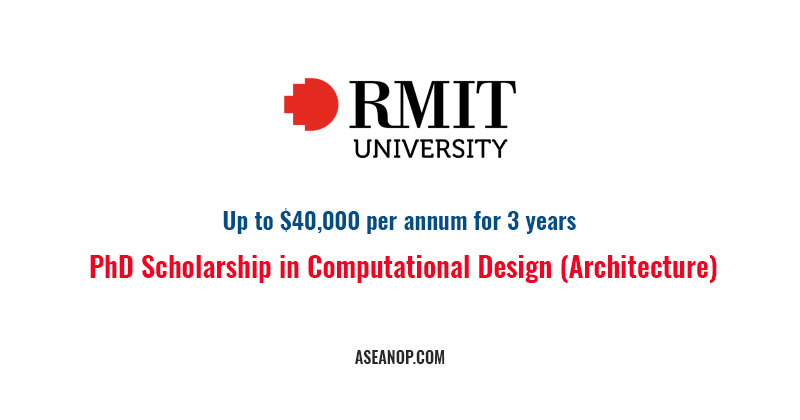RMIT University PhD Scholarship in Computational Design (Architecture)

A PhD scholarship is available for a candidate to undertake research in generative design and the fabrication of complex geometries, with a focus on computational design, as part of the RMIT Boeing Research Alliance.
Value and duration
Up to $40,000 per annum for 3 years with possible six month extension:
- $30,000 per year funded by the School of Architecture and Design, RMIT University
- $10,000 per year top up scholarship from Boeing.
If selected candidate is international the School of Architecture and Design will provide full tuition fee waiver and Overseas Health Cover (OSHC) for duration of candidature.
A second related scholarship focused on Robotic Fabrication and Complex Geometry is available.
Please contact Dr Roland Snooks for more information.
Eligibility
To be eligible for this scholarship you must:
- hold a Master of Architecture or equivalent (such as an accredited B.Arch Hons)
- provide evidence of good oral and written communication skills
- demonstrated ability to work as part of a multi-disciplinary research team
- meet RMIT University’s entry requirements for the Higher Degree by Research programs.
How to apply
To apply, please submit the following documents to Dr Roland Snooks:
- curriculum vitae
- academic transcripts
- three references
- design portfolio
Prospective candidates will be required to submit an application for admission to the Doctor of Philosophy (Architecture & Design).
Short-listed applicants will be invited to attend an interview with RMIT University and Boeing.
Scholarship applications will only be successful if prospective candidates are provided with an offer for admission.
Open date
Applications are now open.
Close date
Applications will close once the candidate is appointed.
Terms and conditions
This scholarship will be governed by the Research Scholarship Terms and Conditions.
Further information
Collaborative research project
This research will be undertaken as part of a larger collaborative research project that will involve three primary areas of expertise: computational design, robotic fabrication and material innovation.
Recent developments in computational/generative design techniques and robotic fabrication will be leveraged to rethink the relationship of structure/surface/services through the design of innovative geometries. The research will include an exploration of the following:
- large-scale polymer additive manufacturing / 3D printing of complex geometry
- printing geometries to enable complex networks of structure, and services embedded within skins/surfaces
- embedding fibre-composite structural elements within 3D printed geometry
- exploring the structural advantages of intricate geometries made possible through computational design and 3D printing
- exploring material characteristics through design and aesthetic considerations
- developing strategies for printing large integrated components to enable rapid assembly
- developing 3D printed joints and connections to enable continuity of structure, electrical, data and mechanical services
- examining the mass-customisation implications of 3D printing and robotic fabrication for intricate geometries and the flexible digital models necessary to enable this.
PhD candidate specialisation: computational design and complex geometry
This candidate would focus on computational design processes and their relationship to the design of complex geometry. It would be expected this candidate would come from a background in architecture with expertise in computational geometry. This candidate would develop new algorithmic design techniques that are capable of integrating and negotiating between various criteria and evaluation processes. This research would focus on the relationship between geometry and performance criteria such as structural analysis.
Research through design/prototyping
Physical prototypes will be the primary medium through which the research will be undertaken. The prototypes will be design-led, experimental and speculative. This research will focus on exploring open-ended possibilities that lie at the intersection and integration of the differing expertise brought together in this research project.
Design-based PhD process
The PhD candidates will be enrolled within RMIT’s School of Architecture and Design, undertaking a hybrid model of research that brings together design and technical innovation. The research will focus on an iterative series of speculative design projects through a process of feedback in which the evaluation of each project is an input into the design and conception of the subsequent project. These projects will be collaborative in nature, with the two PhD candidates working together and in conjunction with the expertise of Boeing and RMIT’s Aerospace Engineering and Aviation program. The School of Architecture and Design conduct PhDs through a creative practice model that involves the constant critique and integration of criticism into ongoing design projects, where the reflection and evaluation of design is the key component of developing new knowledge.
Application material and process
Potential candidates will need to submit, a CV, academic transcripts, details of 3 referees, and a portfolio of design projects/research.
Shortlisted candidates will be required to attend an interview in which they will present their previous design research.
Contact
For further information please contact:
Dr Roland Snooks
roland.snooks@rmit.edu.au
+61 3 9925 3555
